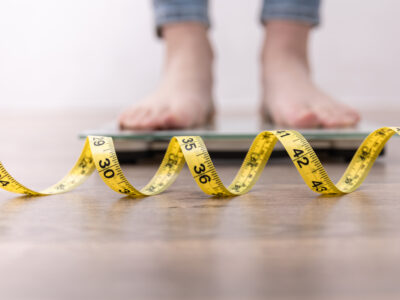Table of Contents[Hide][Show]
Are you feeling frustrated by unsuccessful attempts to lose weight? And those traditional weight loss methods—slashing calories, bumping up your workouts, cutting out carbs and sugar—just aren’t helping.
When that number on the scale refuses to budge, dropping down to your ideal weight may seem impossible…. But it isn’t!
A healthy lifestyle is a great starting point, but effective weight loss requires a more methodical approach and a greater understanding of how your body works.
Let’s walk through our favorite weight-loss strategies to help you drop excess pounds and live your best, healthiest life—including some tricks you probably haven’t tried yet.
Track Your Calories
Are you taking in more calories than you realized? A few bites of your date’s dessert. Eating your child’s leftovers. A quick drink after work with friends.
Your meals and snacks might be on track, with healthy, low-calorie, high-nutrient choices. But what about the other, mindless calories that you’re consuming? Those are the ones that add up and keep you from hitting your weight loss goals.
Try keeping a food diary to get a handle on how much you’re really eating. Websites and apps such as FatSecret can help you stay on track with your calorie intake.
Maximize Your Workouts
Weight loss begins in the kitchen, or so the saying goes. But physical exercise plays an important role, too.
Moving your body at all is better than nothing, but it’s not usually enough to reach bigger weight loss goals. For effective weight loss, you have to pick the right exercises. Here are some suggestions to get the most out of your workouts.
Pick Up Weights
People often turn to cardio as their go-to weight loss exercise. And it can be effective, especially if you haven’t been working out regularly. There’s no doubt that running, cycling, and other high-intensity exercises burn an enormous number of calories.
But don’t skip strength training! Building muscles is crucial to increasing your metabolism and losing weight. In fact, studies show that the combination of aerobic (cardio) exercise paired with strength training is most effective for weight loss.
Related
Park Over Gym: 10 Strengthening Moves You Can Do Amidst Nature
In the Information Age, serious trainees and weekend warriors everywhere are waiting on technology to deliver the next great innovation to the doorstep of the fitness arena. With all of the bells and whistles being promoted as necessary to get ripped, shredded, and downright crazy lean, many have fallen into the “I need a gym …
Use Time More Efficiently
When you’re short on time, opt for a HIIT (High-Intensity Interval Training) workout. The super-powered workouts are excellent for weight loss, and can easily be modified for beginners.
HIIT workouts combine bursts of high-energy exercises such as jumping jacks and burpees with body weight strength training such as squats and push-ups.
Accurately Count Calories Burned
Another thing to keep in mind while you’re working out is not to overestimate the number of calories you’re burning.
Your body will become more efficient as you lose weight and become more fit. The number of calories you burn working out will be lower. So, the workouts you used to lose weight initially won’t be as effective.
Make sure to keep checking in with your workouts and be honest with yourself when you need to move on to heavier weights, a higher intensity, or a new exercise format!
Fire Up Your Metabolism
Now you’re working out more and eating less. From a strictly caloric viewpoint, you should be losing weight.
Unfortunately, this approach can often disrupt your hormones, causing what’s known as metabolic compensation. When this occurs, your metabolism will slow down and stop burning calories effectively, leading to a weight loss plateau.
Signs of a Slow Metabolism
Not sure if your metabolism is off? Check your HEC: hunger, energy, and cravings.
- You’re always hungry, making it difficult to think of anything other than your next meal or snack.
- Your energy level is too low, making workouts frustrating and leaving you constantly fatigued.
- Your cravings are out of control, leading to poor food choices.
All of these feelings are triggered by hormones such as cortisol and insulin. If you’re experiencing any of these, it’s a good sign that you need to get your metabolism back to its normally-functioning levels.
Getting Your Metabolism Back on Track
So how do you “fire up” your metabolism and get it back to work?
It’s all about balance. If you’re eating less, exercise less. And if you’re exercising more, eat more.
Finding your perfect balance between diet and exercise may take a little trial and error. Keep an eye on your HEC while you experiment with different combinations.
Related
Easy Ways To Speed Up Digestion And Metabolism Naturally
Do you want to know how to speed up digestion? These 14 tips will help you do just that plus improve your metabolism in the process.
Reduce Stress
Surprisingly, your mental health can hugely affect the success of your weight loss efforts.
Chronic stress (stress that is constant and long-term), affects your body in many ways. One of these is producing specific chemicals, including hormones such as cortisol.
Some of these hormones affect your body’s ability to burn calories and make your body more likely to store fat.
Excess cortisol, for example, can raise insulin levels, dropping insulin levels and making your body crave sugary, fatty comfort foods. These high-calorie “comfort foods” wreak havoc on your weight loss goals.
High cortisol levels also signal your body to produce less testosterone, decreasing muscle mass and slowing your metabolism. Not only are you consuming more calories, but you’re also burning less calories.
Boost Your Gut Health
Your gut microbiome is teeming with bacteria. Beneficial (good) bacteria coexist with pathogenic (bad) bacteria, with their colonies sharing the limited space.
Ideally, the good bacteria will be so strong and plentiful that they will crowd out the bad bacteria. Unfortunately, the opposite is much more common. The bad bacteria outnumber the good bacteria, resulting in an unbalanced gut microbiome state known as dysbiosis.
Dysbiosis has numerous negative effects on your physical, mental, and emotional health. Weight gain is one of them.
Pathogenic bacteria can cause weight gain in these ways:
- Greater likelihood of anxiety and depression, which can result in cravings and emotional eating.
- Increased insulin resistance, which elevates blood sugar levels and promotes fat storage.
- Decreased ability to break down and absorb nutrients, which can negatively impact your metabolism.
In addition, several studies have shown the importance of not just having beneficial bacteria, but of bacterial diversity. Study participants with more diverse gut microflora were less likely to be obese or overweight.
The Importance of Probiotic Supplements
Probiotics are live bacteria similar or identical to the beneficial bacteria already living in your gut. When you consume them, they join forces with your good bacteria, increasing their quality and quantity. The thriving colonies of good bacteria crowd out the bad bacteria, rebalancing your gut microbiome, bringing bacterial diversity, and ultimately aiding in weight loss.
While probiotics can be found in food and drinks, probiotic supplements are a quick, easy, and effective way to add fuel to your weight loss fire.
Our favorite probiotic is from Just Thrive, and we recommend it for its incredible 100% survivability rate.
See, before your probiotic makes it to your gut, it has to navigate a treacherous journey through your digestive tract, surviving bile, stomach acids, and digestive enzymes. Just Thrive probiotics are surrounded by a natural armor-like endospore that protects them from that toxic environment.
Your supplements arrive in your gut microbiome alive and ready to get to work!
And to give your probiotics an even bigger boost, you can pair them with a prebiotic supplement.
Prebiotics are a food source for the bacteria in your gut microbiome, promoting their flourishing colonies. But be careful; some prebiotics can act as fuel for pathogenic bacteria, too. We recommend this one by Just Thrive, which is specially formulated to only support the good bacteria.
See Your Doctor
Can you honestly say to yourself that you’re exercising regularly, eating healthily, and still not losing weight? If so, then it may be time to visit your doctor.
It’s possible that you have an undiagnosed medical condition preventing you from reaching your weight loss goals. Your doctor can run any necessary tests or order lab work to find out exactly what’s going on with your body. The right prescription can have you feeling and looking your best once again.
You can also talk to your doctor about current medications. Some, such as birth control pills or medications for depression, can cause weight gain. There may be an alternative that’s just as effective, without the unwanted weight side effects.
Make Long-Term Changes
For far too many people, the only focus when losing weight is the number on the scale. And while that might get you to your ideal weight, it won’t keep you there.
Consistency is the key with both diet and exercise. Once you’ve achieved your weight loss goal, you have to keep up the work to maintain your results.
This is why the so-called fad diets don’t typically result in permanent weight loss. Completely cutting out an entire food group isn’t sustainable (or healthy!) for most people.
A diet that allows for moderate portions of most food groups is a far more endurable solution. If you’re unsure what that looks like, a nutritionist can help you design a diet plan.
And extreme exercise, such as hitting the gym for hours each day, is equally unsustainable and can result in exhausted, sore muscles. Your body will eventually demand more downtime, often in the form of exhaustion or injuries.
Plus, other parts of your life will demand attention: kids, work, relationships. Pace yourself with a moderate but consistent exercise schedule that you can stick to.
Final Thoughts
If you’re frustrated by repeated attempts to lose weight and keep it off, you’re not alone. Stubborn fat, weight loss plateaus, and fluctuating numbers on the scale are more common than you might think.
But just because these issues are common doesn’t mean you have to accept them.
When increasing your workouts and decreasing your calories doesn’t work, some simple but effective strategies will help you reach your ideal weight. Even better, they don’t require extreme measures.
Instead, positive lifestyle changes will lead you to your healthiest weight—and healthiest life.
You May Also Like…







